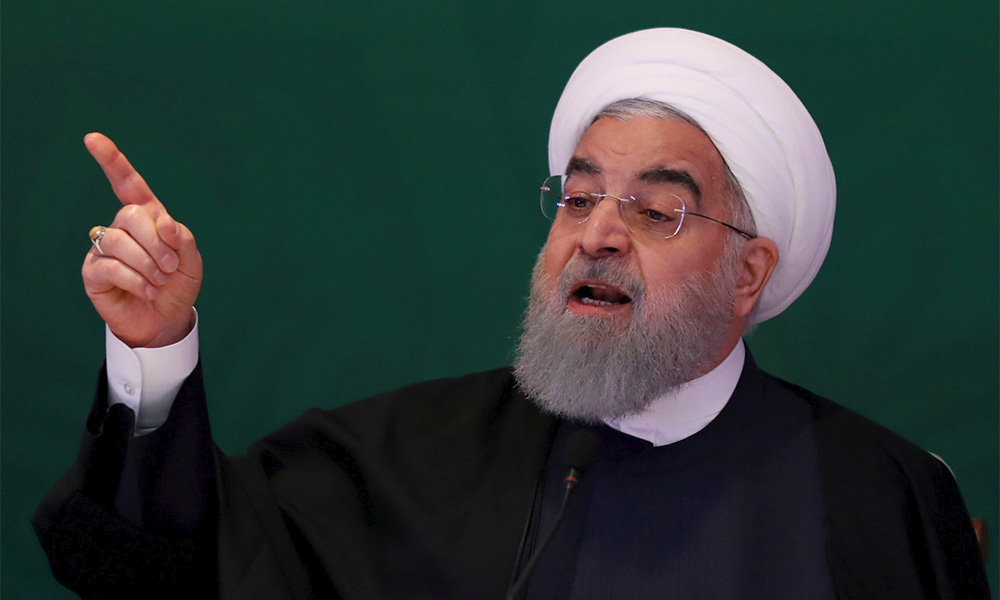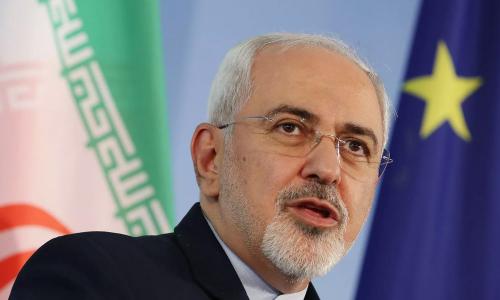Iran says it will defend itself against any aggression
Iran will defend itself against any military or economic aggression, Foreign Minister Mohammad Javad Zarif said on Sunday, calling on European states to do more to preserve a nuclear agreement his country signed.
Speaking at a Baghdad news conference with his Iraqi counterpart Mohammed al-Hakim, Zarif (photo above) said Iran wanted to build balanced relations with its Gulf Arab neighbours and had proposed signing a non-aggression pact with them.
“We will defend against any war efforts against Iran, whether it be an economic war or a military one, and we will face these efforts with strength,” he said.
Strains have increased between Iran and the US after this month’s attack on oil tankers in the Gulf region. Washington, a firm backer of Tehran’s regional rival Saudi Arabia, has blamed the attacks on Iran.
Tehran has distanced itself from the bombings, but the US has sent an aircraft carrier and an extra 1,500 troops to the Gulf, sparking concern over the risk of conflict in a volatile region.
Iraq stands with Iran and is willing to act as an intermediary between its neighbour and the US, Hakim said. Baghdad does not believe an “economic blockade” is fruitful, he added in a reference to US sanctions.
“We are saying very clearly and honestly that we oppose the unilateral actions taken by the United States. We stand with the Islamic Republic of Iran in its position,” Hakim said.
The US and Iran are Iraq’s two main allies.
Meanwhile, Iranian Deputy Foreign Minister Abbas Araqchi arrived in Oman and discussed “regional developments” with Yousuf bin Alawi bin Abdullah, the sultanate’s minister responsible for foreign affairs, Oman News Agency reported.
“Araqchi stressed the importance of peace and security in the Persian Gulf region and warned against the destructive policies of the US and some of its regional allies,” Iran’s Foreign Ministry said on its website. “He rejected any direct or indirect talks with America.”
Bin Alawi last week said that his country is trying “with other parties” to calm Iran-US tensions.
Washington has been seeking to tighten sanctions against Iran as relations worsen under US President Donald Trump, who last year pulled out of a nuclear agreement that predecessor Barack Obama had signed with Iran and other world powers in 2015.

In Tehran, President Hassan Rouhani (photo) floated the idea of holding a referendum over Iran’s nuclear programme, Iranian media reported.
A referendum on the programme could give Iran’s leaders space to manoeuvre and a chance to resolve the stand-off with the US.
Iranian leaders have said they are not seeking war with the US and officials speaking to Reuters from Tehran last week said that despite the sharpened rhetoric with Washington, authorities are trying to avoid open conflict.
“Article 59 of the Constitution (referendum ) is a deadlock breaker... and could be a problem-solver at any junction,” the semi-official news agency ILNA quoted Rouhani as saying late on Saturday.
Rouhani said that, when he was a top nuclear negotiator in 2004, he had proposed holding a referendum on the nuclear issue to supreme leader Ayatollah Ali Khamenei.
Iran has held only three referendums since its 1979 Islamic revolution — to approve the setting up of an Islamic Republic, and then to approve and amend the constitution.
Washington says it has built up the US military presence in the region, accusing Tehran of threats to US troops and interests. Tehran has described US moves as “psychological warfare” and a “political game”.
Separately, a deputy commander of Iran’s elite Revolutionary Guards said the US military presence in the Middle East was at its “weakest in history” despite talk of a build-up.
- Reuters
RM12.50 / month
- Unlimited access to award-winning journalism
- Comment and share your opinions on all our articles
- Gift interesting stories to your friends
- Tax deductable

